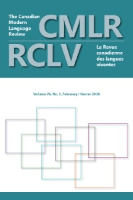
CANADIAN MODERN LANGUAGE REVIEW-REVUE CANADIENNE DES LANGUES VIVANTES
Scope & Guideline
Unlocking New Perspectives in Linguistics and Education
Introduction
Aims and Scopes
- Multilingual Education and Plurilingualism:
The journal explores the dynamics of multilingual education, emphasizing plurilingual approaches that recognize and integrate students' diverse linguistic backgrounds into the learning process. - Language Teacher Development:
It focuses on the preparation and continuous development of language teachers, investigating their identities, beliefs, and pedagogical strategies to enhance teaching effectiveness in diverse classrooms. - Language Assessment and Proficiency:
The journal examines various aspects of language assessment, including proficiency tests and feedback mechanisms, to understand their impact on language learning outcomes. - Sociocultural and Political Dimensions of Language:
Research often addresses the sociopolitical contexts of language use, including issues of identity, power dynamics, and the role of language in heritage and immigrant communities. - Innovative Pedagogical Practices:
The journal highlights innovative teaching practices and curricular designs that foster engagement and language acquisition, particularly in minority language contexts. - Technology in Language Education:
It investigates the integration of technology in language teaching and learning, exploring how digital tools can enhance linguistic interactions and learning experiences.
Trending and Emerging
- Plurilingual Approaches and Language Awareness:
There is a growing focus on plurilingual education, which recognizes the importance of students' multiple languages and promotes language awareness and identity development. - Impact of Immigration and Refugee Experiences:
Research increasingly addresses the challenges and experiences of immigrant and refugee students in language learning contexts, highlighting the need for supportive pedagogical practices. - Anti-Bias and Anti-Racist Education:
Emerging studies emphasize the importance of developing anti-bias and anti-racist stances in language education, aiming to create equitable learning environments for all students. - Indigenous Language Revitalization:
There is a rising interest in Indigenous language education and revitalization efforts, reflecting a broader societal movement towards reconciliation and recognition of Indigenous languages and cultures. - Digital and Online Language Learning:
The journal has seen an increase in research on the use of digital tools and online platforms for language learning, particularly in response to the shifts necessitated by the COVID-19 pandemic.
Declining or Waning
- Traditional Language Teaching Methods:
There is a noticeable decrease in studies focusing on traditional language teaching methods, as the journal increasingly emphasizes innovative and technology-integrated approaches to language education. - Monolingual Language Policies:
Research related to strictly monolingual language policies is dwindling, as the journal shifts its focus towards more inclusive, multilingual frameworks that reflect Canada’s linguistic diversity. - Standardized Language Testing:
There is a reduction in the exploration of standardized testing methods, which may indicate a growing skepticism about their effectiveness in truly assessing language proficiency and learning.
Similar Journals

Deutsch als Fremdsprache-Zeitschrift zur Theorie und Praxis des Faches Deutsch als Fremdsprache
Connecting Theory and Practice in German Language TeachingDeutsch als Fremdsprache-Zeitschrift zur Theorie und Praxis des Faches Deutsch als Fremdsprache is a prominent academic journal published by ERICH SCHMIDT VERLAG in Germany, focused on advancing the field of German as a foreign language. With an ISSN of 0011-9741 and E-ISSN of 2198-2430, this journal has carved out a significant niche in linguistics and language education, reflecting its robust academic rigor as indicated by its ranking in the Q2 in Linguistics and Language and Q3 in Education quartiles for 2023. It occupies an important role in disseminating research, practical methodologies, and theoretical insights that contribute to the improvement of German language instruction globally. While it is not an open-access journal, its influence is bolstered by comprehensive reviews and scholarly contributions that are essential for researchers, educators, and students alike. With a history of converged years from 2013 to 2024, this journal remains a vital resource for those interested in the theoretical and practical aspects of teaching and learning German.
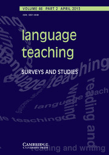
Language Teaching
Shaping the landscape of language education since 1969.Language Teaching, published by Cambridge University Press, is a premier peer-reviewed journal that has been at the forefront of the linguistics and language education field since its inception in 1969. With an impressive impact factor positioning it in the top tier (Q1) of its category, this journal is ranked 22nd among 1,088 in the Arts and Humanities field and maintains an outstanding 98th percentile ranking. Focusing on innovative research and methodologies in language teaching and learning, Language Teaching provides a vital platform for discussing the latest developments in pedagogy, applied linguistics, and curriculum design. Although it does not offer open access options, it reaches a broad audience of researchers, educators, and practitioners dedicated to enhancing language instruction across various contexts. The journal continues to evolve, with plans to cover emerging trends and challenges in language education until 2024, making it an essential resource for anyone invested in the teaching of languages.
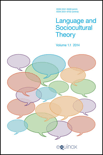
Language and Sociocultural Theory
Decoding the Nuances of Human CommunicationLanguage and Sociocultural Theory, published by EQUINOX PUBLISHING LTD, stands as a vital resource for scholars in the domains of linguistic studies and cultural theory. With its ISSN 2051-9699 and E-ISSN 2051-9702, this UK-based journal has consistently achieved Q1 rankings in both Cultural Studies and Linguistics and Language as of 2023, demonstrating its significant impact within the academic community. The journal's position is further affirmed by its rankings in Scopus, where it occupies the 80th percentile in Cultural Studies and the 72nd percentile in Linguistics and Language, making it a leading platform for cutting-edge research. Though not an Open Access journal, it provides critical insights into the interconnectedness of language and sociocultural dynamics, making it essential reading for researchers, professionals, and students eager to explore the complexities of human communication. Spanning converged years from 2014 to 2023, the journal presents a rich collection of scholarly articles that strive to advance the field and inspire further academic inquiry.
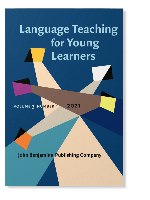
Language Teaching for Young Learners
Transforming language education for the next generation.Language Teaching for Young Learners, published by John Benjamins Publishing Co, is a premier journal dedicated to enhancing the pedagogy of language acquisition in early childhood education. Since its inception in 2019, it has rapidly established itself within the research community, reflected by its high Scopus rankings—placing it in the 85th percentile for Language and Linguistics and the 84th percentile for Education. The journal aims to provide a platform for innovative research, practical insights, and theoretical discussions surrounding the teaching of languages to young learners, thus contributing significantly to the fields of Education and Linguistics. With an open access model currently unavailable, it caters to a diverse global audience, including researchers, educators, and policy-makers, keen on improving pedagogical practices. Located in the Netherlands, the journal's commitment to academic excellence is evident through its Q1 and Q2 rankings in Linguistics and Language and Education respectively, encouraging continual discourse in cultivating effective language education practices.

Porta Linguarum
Elevating the discourse on contemporary language challenges.Porta Linguarum, published by UNIV GRANADA in Spain, is a pioneering journal dedicated to the fields of linguistics and language studies, with a dual focus on the educational implications and applications within these disciplines. Launched in 2008 and continuing its impactful contributions into 2024, the journal is recognized for its rigorous peer-reviewed articles that address contemporary language issues, pedagogical approaches, and linguistic research, evidenced by its notable rankings in the 2023 Scopus metrics. Porta Linguarum holds a distinguished Q1 classification in Linguistics and Language, alongside a respectable Q3 placement in Education, marking it as a valuable resource for academics and practitioners alike. With an impressive ranking of 231 out of 1088 in the Arts and Humanities category and a strong 78th percentile ranking for Language and Linguistics, this journal facilitates the exchange of innovative ideas and promotes scholarly discourse. Although currently not adopting an open access model, it remains an essential platform for advancing knowledge in linguistics and education.

Journal of Asia TEFL
Exploring Linguistic Innovations for Tomorrow's ClassroomsWelcome to the Journal of Asia TEFL, a leading peer-reviewed platform dedicated to exploring the intersections of English language education, linguistics, and the dynamic educational landscapes of Asian contexts. Published by ASIA TEFL in South Korea, this journal has emerged as a pivotal resource for academia since its inception in 2004, with consistently expanding influence reflected in its Scopus rankings, including a notable 76th percentile in Linguistics and Language. With a focus on the evolving methodologies and pedagogical innovations in English language teaching, the journal aims to foster scholarly discussions that enhance teaching practices and policy-making in a globalized world. Although it currently operates without open access, its rigor and relevance in categories such as Education and Linguistics ensure that it remains a valuable asset for researchers, educators, and students seeking to advance their knowledge and practice within this vital field of study.

ELIA-Estudios de Linguistica Inglesa Aplicada
Unveiling the Nuances of English: A Scholarly JourneyELIA-Estudios de Linguistica Inglesa Aplicada, published by the University of Sevilla, Faculty of Philology, is an esteemed open-access journal that has been a cornerstone in the field of English Linguistics since its establishment in 2000. With an ISSN of 1576-5059 and an E-ISSN of 2253-8283, ELIA aims to foster scholarly research and discourse by providing a platform for innovative studies in linguistics and applied language studies. As a testament to its academic rigor, the journal has achieved a Q2 ranking in Linguistics and Language for 2023, reflecting its impact and relevance within the academic community. The journal is indexed in Scopus, further solidifying its standing with ranks in both the Arts and Humanities and Social Sciences categories. Researchers, professionals, and students alike will find valuable insights and research findings that contribute to the evolving understanding of English linguistics. The journal is based in Sevilla, Spain, and can be accessed freely online, making it an accessible resource for those engaged in the study of language and linguistics.

Eurasian Journal of Applied Linguistics
Innovating Language Education Across EurasiaThe Eurasian Journal of Applied Linguistics, published by Hacettepe University, ELT Department, is a distinguished open-access journal that has been contributing to the fields of linguistics and language education since 2015. With a focus on bridging cultural and linguistic understandings across Eurasia, this journal provides a platform for researchers, educators, and practitioners to share cutting-edge studies, innovative pedagogical strategies, and insightful analyses. The journal holds notable Scopus rankings within the Language and Linguistics (Rank #155/1088, 85th Percentile) and Education (Rank #696/1543, 54th Percentile) categories, evidencing its growing impact within the academic community. As it prepares to converge into a new phase from 2018 to 2024, the Eurasian Journal of Applied Linguistics aims to uphold its mission of fostering interdisciplinary dialogue and advancing knowledge in applied linguistics and its related fields.
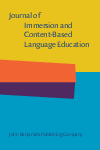
Journal of Immersion and Content-Based Language Education
Transforming Language Learning Through ImmersionJournal of Immersion and Content-Based Language Education, published by JOHN BENJAMINS PUBLISHING CO, is a leading academic journal dedicated to the fascinating intersection of language education and immersive learning experiences. With its ISSN 2212-8433 and E-ISSN 2212-8441, the journal has carved a prominent niche in both the Education and Linguistics fields, earning a Q2 ranking in Education and a prestigious Q1 ranking in Linguistics, as noted in 2023. Situated in the Netherlands, this journal caters to a global audience, offering access to cutting-edge research and methodologies in content-based language instruction. Committed to fostering scholarly dialogue, the Journal of Immersion and Content-Based Language Education empowers researchers, educators, and students alike to explore innovative practices and theoretical frameworks. With a Scopus ranking reflecting its impact in the field—#196/1088 in Language and Linguistics at the 82nd percentile and #807/1543 in Education—this journal is a vital resource for those committed to enhancing linguistic education through immersive methodologies.
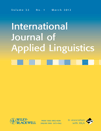
International Journal of Applied Linguistics
Leading the Discourse in Applied Linguistics ScholarshipInternational Journal of Applied Linguistics, published by WILEY, is a premier platform for cutting-edge research in the field of applied linguistics. With a notable Impact Factor and ranked in the top Q1 quartile of linguistics and language, this journal serves as an essential resource for scholars, practitioners, and students. The journal’s wide-ranging scope includes various subfields such as language acquisition, language education, sociolinguistics, and discourse analysis, fostering multidisciplinary approaches to language studies. It has achieved a significant Scopus Rank, placing it in the 90th percentile for both Arts and Humanities as well as Social Sciences categories, reflecting its high visibility and influence in the academic community. The International Journal of Applied Linguistics is committed to advancing the understanding of language use in real-world contexts through rigorously peer-reviewed articles that contribute to both theory and practical applications. While it is not an open-access journal, it remains a highly respected publication for researchers looking to disseminate and acquire knowledge in applied linguistics.